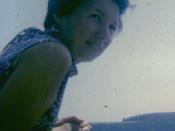Known as a satiric chronicler of upper-middle-class American, John Cheever (1912-1982) is "the Chekhov of the suburbs." His works are noted for ironic sketches of domestic and expatriate New Yorkers and New Englanders. His ability to capture the human dilemma and to combine it with one of the most overlooked manifestations of the American landscape, suburbia, shows the power and insight of Cheever's art. In the famous The Enormous Radio, Cheever depicted the dilemmas of a couple in the 1950s. In the story, Sin is a hidden theme that threads through the entire story. The connotative sins are: sin of the radio, sins of Irene and Jim, and the denotative sins are: the original sin and the sin of knowledge. This paper explains the five sins and their inner links.
First of all, the sin of the enormous radio is that it causes the loss of innocence, moral corruption and break of the family.
Like Satan who is ugly and beautiful simultaneously, the radio is physically ugly but boasts for its beautiful music. Satan tempted Eve with knowledge; the radio lures Irene with the privacy of her neighbors. Similarity exists--- Eve was driven out of the paradise, and Irene was driven out of the paradise of marriage in the end. The radio is a modern copy of the archetype of the Original Fall of Adam and Eve. In some aspects, the enormous radio symbolizes Pandora's Jar. Pandora, the first woman of the world, opened the jar given by gods, out of which poured ills, torment, pain, disease, anguish, pestilence, and all other evil and despair, only hope was left for human. Being a "powerful and ugly" â dictagraph, the enormous radio tells the stories of other people, deceit, hypocrisy, immoralness, cruelness, dishonor, poverty, illness, adultery and violence.


